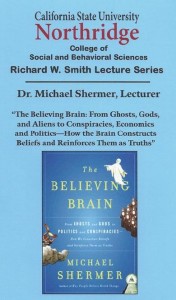CSUN’s Smith Lecture to Explore the Believing Brain
 From their earliest ancestors, humans have always sought to believe in things bigger than themselves and have created explanations for the unexplainable.
From their earliest ancestors, humans have always sought to believe in things bigger than themselves and have created explanations for the unexplainable.
Psychologist and science historian Michael Shermer will discuss how the brain constructs beliefs and reinforces them as truths as part of California State University, Northridge’s Richard W. Smith Lecture series on Thursday, Oct. 24. The lecture, hosted by CSUN’s College of Social and Behavioral Sciences, is scheduled to take place at 7 p.m. in the Whitsett Room, Sierra Hall 451, on the west side of the campus located at 18111 Nordhoff St. in Northridge.
Shermer’s lecture is based on his new book, “The Believing Brain: From Ghosts, Gods and Aliens to Conspiracies, Economics and Politics–How the Brain Constructs Beliefs and Reinforces Them as Truths,” which synthesizes 30 years of research. In the book, he upends traditional thinking about how humans form beliefs about the world. Simply put, beliefs come first and then the explanations follow. The brain, Shermer argues, is a belief engine. Using sensory data that flow in though the senses, the brain naturally begins to look for and find patterns, and then infuses those patterns with meaning, forming beliefs.
Shermer is the founding publisher of Skeptic Magazine; editor of www.skeptic.com; the executive director of the Skeptics Society; a monthly columnist for Scientific American; the host of the Skeptics Distinguished Science Lecture Series at Caltech; and adjunct professor at Claremont Graduate University and Chapman University.
He has also authored “The Mind of the Market,” “Why Darwin Matters: Evolution and the Case Against Intellectual Design,” “The Science of Good and Evil: Why People Cheat, Gossip, Care, Share and Follow the Golden Rule,” and “Why People Believe Weird Things.” He has appeared on “The Colbert Report,” “20/20,” “Dateline,” “Charlie Rose,” “Larry King Live” and “Oprah” and in various interviews in documentaries on PBS, A&E, Discovery Channel, The History Channel, The Science Channel and The Learning Channel. He was also the co-host and the co-producer of the 13-hour Family Channel television series “Exploring the Unknown.”
Shermer received his bachelor’s in psychology from Pepperdine University; master’s in experimental psychology from California State University, Fullerton; and his doctorate in the history of science from Claremont Graduate University.
The lecture is free and open to the public. However, seating is limited. For more information about the event or to RSVP, please call the College of Social and Behavioral Sciences at (818) 677-4030.

 experience
experience